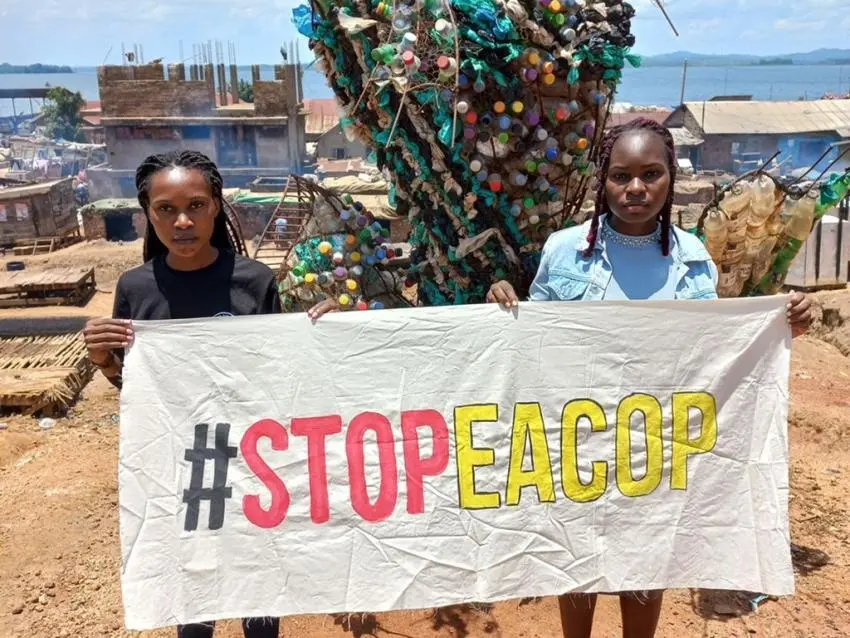
The StopEACOP coalition has welcomed the recent announcement that Mitsubishi UFJ Financial Group (MUFG) of Japan will not be involved in financing the East African Crude Oil Pipeline (EACOP).
The highly controversial EACOP project has raised significant concerns regarding its impact on climate change, nature and human rights. MUFG’s decision is a direct result of the dedicated efforts of regional and global climate activists who are part of the StopEACOP coalition.
In response to an inquiry from 350 Japan, MUFG staff clarified their position on the matter, citing the exceptional circumstances that prompted their response. “Normally, we refrain from commenting on individual transactions, even if we are not involved in, or have ruled out, the financing of a project. However, considering the immense interest in EACOP, we can confirm on an exceptional basis that we are not involved in its financing.”
MUFG’s announcement follows the withdrawal of another major Japanese bank, Sumitomo Mitsui Financial Group (SMBC Group), which, like MUFG, has been a significant financier of TotalEnergies, the primary shareholder of the contentious pipeline.
MUFG attributed its decision to the heightened level of interest in the EACOP project, which is largely due to the tireless efforts of activists from the StopEACOP coalition, 350 Japan, and campaigners from Japan, Uganda, and Tanzania.
The proposed EACOP pipeline, spanning 1,443 kilometres from Hoima in Uganda to Tanga Port in Tanzania, is set to become the world’s largest heated crude oil pipeline. However, the project has faced vehement opposition due to its potential contributions to climate change and human rights abuses, including the displacement and loss of livelihoods for communities residing along the pipeline route.
“MUFG has been a staunch supporter of Total, so their confirmation of non-involvement in EACOP is a significant development. It further highlights the problematic and harmful nature of this project and the risks associated with any institutions backing it. While we appreciate this announcement, we remain concerned that banks like Standard Bank continue to support this project. We hope that MUFG’s decision will compel Standard Bank to reconsider its stance and withdraw its support for EACOP,” stated StopEACOP campaign coordinator, Zaki Mamdoo.
“The response from MUFG is good news for the people of Africa, Japan, and the world. With this announcement, all three major Japanese banks have distanced themselves from the East Africa Crude Oil Pipeline (EACOP), which poses threats to the people and environment of Africa and could result in annual CO2 emissions of up to 34 million tons. The Japanese government and private sector should support renewable energy, the energy of the future, rather than clinging to fossil fuels, the energy of the past,” added 350.org Japan interim team lead, Masayoshi Iyoda.
“MUFG’s decision to rule out financing for EACOP acknowledges the devastating social, economic, and environmental impacts of the project in Uganda. This decision sends a powerful message to the financial sector and the world, emphasizing the importance of prioritizing the well-being of communities and the planet over short-term gains. It serves as a reminder that true progress lies in fostering development that respects communities, protects ecosystems, and contributes to a sustainable future for all,” said Africa regional campaigner at 350 Africa, Charity Migwi.
“MUFG’s move to follow its Japanese counterparts and disassociate itself from EACOP should serve as a stark warning to Chinese lenders considering support for the project. Banks such as ICBC, which still acts as a financial advisor to EACOP, as well as China EXIM Bank, should take their cue from Xi Jinping’s commitment to environmental protection and become true leaders in sustainability. This can only be achieved by following the example set by their Japanese peers and ruling out any involvement or financing of this dangerous and high-risk project,” added climate campaigner and researcher at BankTrack, Henrieke Butijn.

